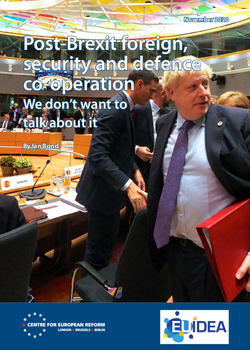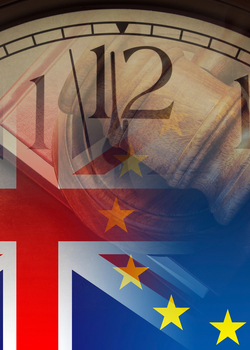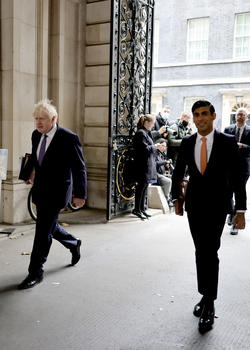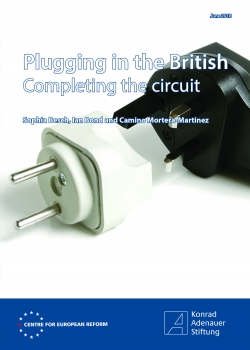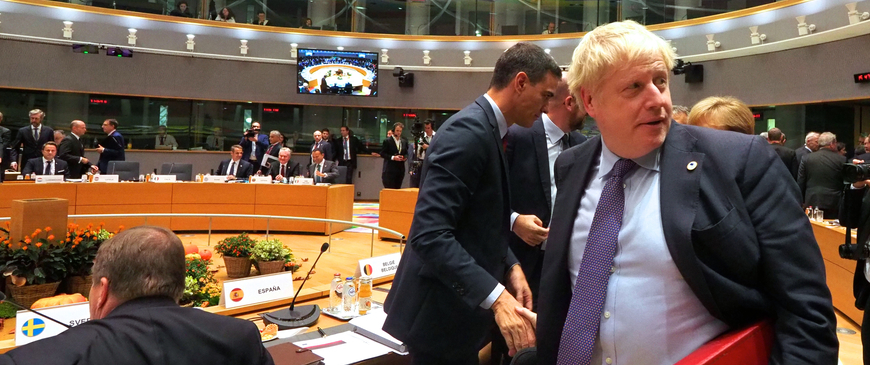
Post-Brexit foreign, security and defence co-operation: We don't want to talk about it
- The government of Boris Johnson sees little added value in a contractual arrangement with the EU on foreign, security and defence policy co-operation. It believes that the UK can instead work bilaterally with major EU member-states, who will then bring the rest of the member-states and the EU institutions into line.
- The Johnson government’s scepticism about binding external security co-operation arrangements has some justification. The EU has diverse arrangements for foreign, security and defence co-operation with partners, from informal to treaty-based. But even legally-binding consultation mechanisms give third countries little added influence in EU decision-making, while the cost of not having a formal arrangement is minimal.
- Given the other difficult issues yet to be resolved in the EU-UK negotiations, there is now no chance of an immediate agreement on foreign, security and defence co-operation, especially one as comprehensive as the EU has proposed. The EU is concerned that in the absence of a structured relationship, UK policy could diverge from its own over time. It worries that London might then try to manipulate the EU by cultivating relationships with certain member-states in the hope of getting them to advocate for UK positions in EU discussions.
- If the EU and UK agree on a deal covering trade and law enforcement co-operation, it is possible that they might agree later to limited foreign, security and defence co-operation with a minimal formal structure (or none at all). The EU should be open to this, provided that any arrangement helps the Union to pursue its external policy objectives more effectively. The UK should also leave the door open to a closer relationship in future, and should not underestimate the value of structured contacts with the EU as a complement to bilateral relationships with member-states.
- The failure of the EU and the UK to agree on the need for contractually-based future co-operation on external security has highlighted shortcomings in the EU’s relationships with third countries in this area. The EU should rationalise these relationships. It should give formal channels to influence decisions to those partners (potentially including the UK in future, whatever its current position) which are more willing to follow co-ordinated policies and contribute to EU operations.
Foreign, security and defence policy barely featured in the 2016 Brexit referendum campaign. The British government’s two-part pre-referendum report, totalling about 150 pages, hardly mentioned external security.1 More than 60 per cent of voters surveyed in an opinion poll thought that leaving the EU would not affect the UK’s influence in foreign affairs.2 Since the referendum, arrangements for future foreign, security and defence co-operation have had a much lower profile than the future trade relationship or the mechanisms for law enforcement and judicial co-operation.
The initial assumption, on both sides, was that it would be easier to reach agreement on foreign and defence policy co-operation than other issues. In February 2018, the European Commission referred to the possibility of a free-standing agreement on the UK’s future relationship with the EU’s Common Foreign and Security Policy (CFSP) and Common Security and Defence Policy (CSDP) entering into force during the post-Brexit transition period, before a wider agreement on trade and other issues. In then Prime Minister Theresa May’s speech to the 2018 Munich Security Conference a few days later, she echoed this idea. In May 2018 the British government called for an early agreement to “ensure there is no drop off in our mutual effort in support of European security”.3 In the negotiations with the EU, May sought “an ambitious partnership covering the breadth of security interests including foreign policy, defence [and] development”.4 The Political Declaration (PD) accompanying the 2019 Withdrawal Agreement (WA), which speaks of “ambitious, close and lasting” security co-operation, is largely the product of negotiations while she was in power, and went mostly unchanged by her successor, Boris Johnson.
But since Brexit, British negotiators have refused to discuss external security co-operation as an element in the future relationship. Trade and law enforcement co-operation have dominated the talks. While at least some parts of the British government seem concerned about the implications of no deal on economic or police co-operation, neither Johnson nor any of his ministers seem worried that there will be no agreement on external security co-operation by the end of the post-Brexit transition period.
This policy brief examines why shortcomings in the EU’s foreign, security and defence policy relations with third countries may be relevant to the UK’s position on future co-operation in these areas. On the assumption that the UK position will not change before the end of the transition period, it looks at possible arrangements falling short of a legally-binding agreement, from the perspective of negotiability with the UK as well as their contribution to meeting EU objectives. It assesses the possible impact on the EU and the UK of having a treaty on external security co-operation (however unlikely that now seems), no formal agreement, or a ‘light’ agreement. And it suggests how the EU could make its foreign, security and defence co-operation with third countries, potentially including the UK, more effective.
The (very) variable geometry of third-country co-operation with the EU in external security policy
The EU’s foreign, security and defence policies are far from monolithic, even internally. Denmark has an opt-out from CSDP; 25 member-states have opted in to Permanent Structured Co-operation (PESCO); and there are a variety of informal groupings of member-states, some of which also include third countries, such as the E3 (France, Germany and the UK) or the Nordic/Baltic Eight (EU members Denmark, Estonia, Finland, Latvia, Lithuania and Sweden, plus Iceland and Norway).5 The EU’s external security relationships with non-members are equally varied in form and content: arrangements with third countries range from almost entirely informal to treaty-based.
Fourteen countries (candidate countries; potential candidate countries; EEA/EFTA states; and the Eastern Partnership countries excluding Belarus) are invited to align themselves with EU declarations, statements in some international organisations and EU sanctions regimes. Some, such as Albania and Norway, almost always do so; others, notably Turkey and Azerbaijan, rarely do.6 Candidate countries and potential candidate countries are expected to follow the EU’s lead – though there are no sanctions for not doing so – while having no formal channels for commenting on proposed actions before adoption. Alignment merely enables them to demonstrate that they are part of the same political space as the EU.7
Norway has no formal agreement with the EU on external policy co-operation, but the informal political dialogue accompanying the biannual meetings of the European Economic Area Council covers foreign policy issues. Several Council working parties hold regular consultations with Norway and other EEA countries. In discrete areas of Norwegian expertise (especially in conflict resolution) Oslo can be quite influential. But as the Common Foreign and Security Policy (CFSP) has taken on more ‘legal’ aspects, especially through the increased use of sanctions, Norway’s lack of formal opportunities to comment on measures that may cause domestic economic and political pain has become more of a disadvantage.8 As a member of the EEA and Schengen, in almost every case the simplest option for Norway is to follow EU sanctions regimes, whether these involve asset freezes or visa bans.
Scheduled dialogues, though often formalistic, create deadlines that can focus participants’ minds on solving problems.
In contrast to its informal arrangements with Norway, the EU has legally binding agreements on foreign policy co-operation with some countries, including Canada and Japan. The EU-Canada Strategic Partnership Agreement (SPA) aims to enhance external policy coherence in many areas. It sets out the levels and, in some cases, even the frequency of EU-Canada political dialogues. The EU-Japan SPA identifies even more subjects for dialogue, though it is less prescriptive about structures and the frequency of meetings. Canadian officials complain privately that the SPA was imposed on Canada by the EU even though previous, more flexible arrangements worked well. From the EU institutions’ perspective, however, scheduled dialogues, though often bureaucratic and formalistic, create deadlines that can help to focus participants’ minds on solving problems.
The EU-US external security relationship is not treaty-based. Instead, it is based on the non-binding ‘Transatlantic Declaration’ of 1990 and the ‘New Transatlantic Agenda’ of 1995, which provide for regular contacts on a wide range of subjects at all levels from heads of state and government to experts. However, most of the US’s substantive foreign policy interactions with the EU are informal, and take place with key EU officials or small groups of member-states (in particular with the E3: France, Germany and – until Brexit – the UK). A 2005 review carried out for the European Commission concluded that the machinery set up by the New Transatlantic Agenda resulted in “overabundance of process, which is disproportionate to actual output”.9 Fifteen years later, US diplomats still seem to subscribe to that view.
The EU does not have a single model for third-country participation in CSDP civilian missions and military operations. Some 45 non-EU states have contributed personnel since the first operation in 2003, including almost all the states that acceded to the EU in 2004 or later. Eighteen countries have ‘Framework Participation Agreements’ governing their contributions, but others, including countries like Switzerland that regularly contribute to CSDP missions, have more ad hoc arrangements. Third countries such as Norway that could bring significant capabilities to the table are unable to influence the early stages of operation planning.10
Overall, there is little correlation between how closely a third country is willing to bind itself to the EU in its external policy relationship and the influence it has on decisions: in all cases, the EU guards its decision-making autonomy. Moreover, since external security is a common good, ‘excludability’ – the ability to prevent a third country benefiting from any EU policy successes unless it has contributed financially or in other ways to the common EU effort – is irrelevant in the external security field.11 In the economic field, a country that wants to enjoy the benefits of single market membership has to abide by EU rules and pay into the EU budget; but if the EU mounts a CSDP operation to stabilise a conflict, even countries that contribute nothing to it will share in the benefits of enhanced international security or reduced irregular migration.
These shortcomings in the EU’s external security relationships with third countries tend to be overlooked by member-states and EU institutions, resulting in a mismatch of perceptions. On the one side, in the view of an EU official speaking privately, the Union believes that it is offering the UK a uniquely advantageous foreign, security and defence relationship, drawing on the best elements of its relationships with others. According to a British official speaking privately, however, the perception of the current British government – unlike its predecessor – is that there are few incentives for the UK to have any contractual external security relationship with the EU. Its interests are different from those of third countries that seek a closer relationship with the Union across the board, such as candidate and potential candidate countries. As the UK seeks to underline its independence from the EU, it believes that it would have little to gain from institutional arrangements for external security co-operation with Brussels.
The EU and UK negotiating positions: The sound of one hand clapping
Although the EU acknowledges that the UK does not want to discuss foreign, security and defence co-operation, the Union has published proposals for an agreement on these issues, based on the Political Declaration. The draft resembles the EU-Japan SPA more than the EU-Canada SPA, since it does not set out detailed arrangements for political dialogue, but lists a number of general areas for co-operation:
- Improving the effectiveness of international organisations, and consulting each other on preferred candidates before elections to positions in such organisations.
- Sanctions, including discussions before EU sanctions are adopted “to allow for close alignment” of EU and UK regimes. EU officials say that such institutionalised pre-decision consultation with a third country is unprecedented, but reflects the UK’s sizeable contribution to EU sanctions regimes while it was still a member-state.
- Crisis management, including participation in CSDP missions and operations. Though these arrangements would not allow the UK to be directly involved in operation design and planning, the draft foresees intensified exchanges of information “at relevant stages of the planning process… proportionately to the level of the United Kingdom’s contribution”. A larger UK commitment would translate into more influence.
- Defence capability development, including involvement in European Defence Agency (EDA) activities and PESCO projects.
- Arrangements to facilitate intelligence exchanges.
- Galileo (the EU’s satellite navigation system), giving the UK access to the Public Regulated Service (the encrypted signal for government users) under certain conditions.
- Development assistance – but without any reference to joint programming or UK contributions to EU development funding.
Scenarios for the future EU-UK foreign, security and defence relationship
Based on the proposals put forward by the EU side, the current situation in the negotiations, and the stated position of the UK side, there are three possible scenarios for the future foreign, security and defence relationship
The EU’s draft gives the UK scope to influence policy in specific areas, including sanctions.
An ambitious agreement. At this stage, with only weeks left until the end of the transition period, there is no chance that the UK will change course and agree to the kind of relationship that the EU has proposed. Nonetheless, according to an EU official, a legally-binding agreement on external security co-operation would be the best way for the EU to ensure predictability and stability in this aspect of its relationship with the UK, regardless of “political volatility” in areas such as trade.
Theresa May would probably have welcomed much in the EU’s draft. It gives the UK scope to influence policy in specific areas (including sanctions), without being expected to align itself automatically with EU statements or other actions, or contribute to all CSDP missions and operations. The Johnson government’s approach, however, is incompatible with such a close, structured relationship.
Even before Brexit, Foreign Secretary Dominic Raab limited British ministerial and official contact with the EU institutions to participation “only in those EU meetings where the UK has significant national interests involved”.12 In a subsequent letter to the Chair of the House of Commons Foreign Affairs Committee, Raab stated: “We have never defined our global outlook just through our EU membership”.13 He sees the ‘Five Eyes’ (Australia, Canada, New Zealand, the UK and the US) and democratic states in the Indo-Pacific region as the UK’s key partners for the future, rather than the EU.
British ministers plan to work through bilateral relationships or ad hoc coalitions, in particular the E3.
According to a British official, if the EU invited the UK to align itself with CFSP actions, London would regard that as “subjugation to EU decision-making”. And it regards the clauses that the EU insists on in third-country agreements, allowing for their suspension in the event of violations of human rights and democratic norms, as politically toxic.
In the defence field, a British official said privately that while May wanted a “hand on the tiller” of EU initiatives, to ensure their continued compatibility with NATO, Johnson would not expend negotiating capital on getting access to them when he doubted that they would succeed.
No agreement. The most likely scenario is that there will be no foreign, security and defence agreement, and that any future co-operation will be ad hoc. This outcome would be a result of three assumptions that underpin British government policy:
- First, that the UK is fully sovereign in its decision-making (Johnson and Raab are said to reject the idea of being foreign policy “auxiliaries” to the EU).
- Second, that its peers are other major nation-states (including EU member-states), not the EU.
- Third, that no major third country has a foreign policy relationship with the EU institutions that is ‘load-bearing’: major powers instead agree on courses of action with the main EU capitals, which then bring the institutions into line.
As a former member-state seeking to emphasise its ‘independence’, the UK does not believe that its influence in Europe’s security affairs depends on a contractual relationship with the EU, but on its status as a permanent member of the UN Security Council, a NATO member and a major military power. British ministers therefore plan to work through bilateral relationships or ad hoc coalitions (in particular the E3), rejecting real or imagined constraints on the UK’s freedom of manoeuvre that would be the price for having a formal relationship with the EU institutions.
A delayed and less formal agreement or set of agreements. If an agreement on trade and law enforcement co-operation can be reached by the end of 2020 (by no means certain, at the time of writing), the UK might then be willing to discuss foreign, security and defence policy co-operation. At some point in the future the EU and UK might be able to agree on a relationship, though to meet UK objectives it would have to have a minimal formal structure or none at all.
With that in mind, the EU should identify the bare minimum of institutional underpinning needed to facilitate co-operation. The Union might prefer a legally-binding SPA-like agreement, but most aspects of foreign, security and defence policy co-operation can function without a treaty. Three possible exceptions are agreements on (a) the exchange and protection of classified information; (b) the participation of UK personnel in CSDP missions and operations; and (c) UK participation in defence industrial co-operation through the EDA.
The UK accepts the need for an agreement on the exchange of classified information to enable co-ordination on matters such as sanctions; the only question is whether it should be a free-standing agreement (the UK preference) or part of an overall agreement (the EU view). So far, however, the UK has shown no interest in a Framework Participation Agreement to allow UK troops to take part in CSDP operations – though it may not rule this out in future, if the EU launches an operation that the UK is interested in. Nor has it tried to negotiate access to EU defence programmes (though UK defence firms are concerned that without an agreement they will be at a disadvantage in future European collaborative projects).
If the UK continues to be a reluctant partner, the EU should consider an incremental approach to co-operation, starting with issues such as sanctions policy where the advantages of working together are clearest. The EU and US achieved a lot in 2014 through informal co-ordination on sanctions against Russia after the annexation of Crimea. The Union could work on the same basis with the UK, which has acknowledged expertise in identifying individuals who should be targeted with sanctions and documenting the reasons for sanctioning them in ways that will stand up to legal challenge.
Impact of the three scenarios on the effectiveness of EU and UK policy
Even if there is no agreement on co-operation when the post-Brexit transition period runs out, by comparison with the impact on trade or law enforcement co-operation, the practical difference between the three scenarios would be relatively limited. In the foreign policy area, much EU (and UK) activity is declaratory. The EU’s draft agreement calls for “effective consultations in international fora”, which presumably means co-ordination on statements and other initiatives. In the event of no deal, in theory the UK could deliberately take a visibly different line from the EU. That would reduce the impact of EU statements (made on behalf not only of the 27 but a wider group of countries) in international fora such as the UN Human Rights Council. More likely, the UK would do what it is doing at present, described by one EU official as “socially distancing” from the EU: making its own statements without co-ordinating them with the Union; but remaining close to the substance of EU positions. For the UK, the symbolism of taking sovereign decisions independently of the EU seems to be key – though in some cases the UK has been able to go further or faster than the EU, for example in imposing sanctions on Belarus and reacting to China’s crackdown on Hong Kong’s freedoms.
For the UK, the symbolism of taking sovereign decisions independently of the EU seems to be the key.
In relation to sanctions, having no deal might make a significant difference. With no agreement on the exchange of classified information, co-ordination on sanctions lists would be much harder. If there were no trade agreement either, and relations were acrimonious, the UK might completely stop co-operating with the EU on sanctions issues (on which – for the moment – it continues to work with the the European External Action Service (EEAS) and the Commission). Separate EU and UK sanctions regimes are likely to be less effective: the City of London’s role as a financial hub complements the EU’s role as a major trading partner of most countries.
In the defence field, the UK’s contributions to CSDP missions and operations as a member-state were limited. In the event of no deal, EU officials acknowledge privately that the EU would risk losing access to some UK enablers (such as strategic air transport), and to the UK’s military planning capabilities. But the UK could still work with EU members in other formats, whether through NATO, France’s European Intervention Initiative (EI2 – in which the UK, Norway and 12 EU members take part) or ad hoc coalitions of the willing.
The EU may be able to increase its role in defence industrial co-operation now that the UK is not obstructing it. On the other hand, the UK defence industrial sector is one of the largest in Europe, and is likely to continue to supply EU customers – though UK defence manufacturers might suffer from supply chain disruptions in the event of no deal on trade.
The recent EU agreement on the conditions for third-country participation in PESCO projects should offer UK defence firms an opportunity to stay involved in EU defence co-operation – but their participation will depend on a list of conditions being met, including the UK having an agreement on the exchange of classified information in place, and will be subject to case-by-case Council approval.14 The EU will be thinking not only of the capabilities and technology it is losing as a result of Brexit, but of the possibility that competition from the UK could damage EU defence firms, while the UK defence market itself could become less open to foreign competition.15 There is a significant risk that the ability of both the EU and the UK to remain at the cutting edge of key defence technologies may be damaged in the event of no deal, or a thin deal that creates disincentives for defence industrial co-operation between the two.
The impact of the three scenarios on EU unity
The EU sees a foreign, security and defence policy agreement with the UK as best for its own internal unity. The EU institutions are concerned that if there is no agreement, the UK might try to ‘divide and rule’, for example by upgrading defence relations with individual states or groups of states that might then represent the UK’s point of view in the EU. The institutions have not needed so far to ‘police’ the UK’s bilateral contacts with member-states, but they are wary.16
The interest of some member-states, particularly France, in creating non-EU forums in which the UK can take part, including EI2, is also of concern to the institutions. While EI2 could act as a bridge to the UK, it might detract from efforts to make CSDP more effective. The French proposal for a European Security Council, though currently dormant, was also designed partly to keep the UK engaged in European foreign policy formation; it too risks shifting the focus of decision-making away from EU structures, creating discord between its members and other EU member-states.17
The E3 format is viewed more positively in Brussels, both because it has helped to keep UK and EU policies towards Iran aligned, even after Brexit (and in the face of US hostility), and because the EEAS participates informally in some E3 consultations. The UK might try to broaden the E3’s agenda and use it as a channel to influence EU thinking indirectly. For smaller EU member-states, however, the idea of decisions being pre-cooked in the E3 is unsettling; they would prefer more inclusive forums for consultation with the UK.
Ultimately, with or without an agreement on co-operation, UK and EU interests in European and international security are likely to remain similar. If trade and economic relations break down, the UK could in theory try to undermine EU cohesion across the policy spectrum (however unlikely that might be). But EU institutions should be more concerned about the on-going efforts of other powers like China, Russia and (at least in the Trump era) the US to undermine EU unity, than anything the UK might do.
Outlook and conclusion
Though in recent years the increased use of sanctions as a tool of CFSP has led to some ‘legalisation’ of EU foreign policy, it remains the most inter-governmental and least communitised area of EU policy.18 It should therefore be easier in theory for the EU to co-operate flexibly with third countries in CFSP (and in CSDP) than in other areas. Yet it now appears that there will probably be no foreign, security and defence agreement at all with the UK.
The British government may be underestimating the advantages of regular, structured contacts with the EU institutions.
The EU should accept that in the short term some of the things the UK does internationally are likely to be designed to look different from what the EU itself is doing, though they are unlikely to undermine or contradict the substance of EU positions. The UK’s pre- and post-Brexit interests (though currently under review in its Integrated Review of Security, Defence, Development and Foreign Policy) are unlikely to differ much. The Union should leave the door open to closer co-operation in future, once the UK has satisfied its domestic political need to show that it is accepted internationally as a fully sovereign and independent player.
The UK too should leave the door open to a closer relationship in future. The UK will not need a close institutional partnership with the EU in the external security realm as much as it needs legally binding arrangements to support economic and law enforcement co-operation. But – even if its foreign and defence interests will not depend on having a treaty with the EU – the British government may be underestimating the advantages of regular, structured contacts with the EU institutions as a complement to bilateral relationships with member-states. Berlin and Paris are not the only players. The Commission and the External Action Service may have their own insights into intra-EU foreign policy debates. In some areas, notably sanctions policy and implementation, the EU has offered the UK a chance to institutionalise its influence in the EU decision-making process; that opening will only be available in the framework of a formal EU-UK agreement, however.
But the EU should also use the time before the UK re-engages to review its foreign, security and defence relations with other like-minded third countries. The UK’s dismissive view of the existing models may be exaggerated, but feedback from the EU’s other partners shows that they are dissatisfied with how little attention the Union pays to their views.
The EU argues that its decision-making autonomy could be compromised by offering third countries more influence. The UK at one stage reportedly suggested to the EU side that its aim was to have as close an informal relationship with the EU as it had with the US – able to influence decisions without being in the room when they were taken. But the EU response was negative, leaving the UK with the impression that the institutions saw that as too much influence. In a challenging international environment, the EU should focus less on the purity of EU decision-making, and more on the effectiveness of the decisions taken.
In the single market context, the Commission consults EEA countries when legislation is being prepared, giving them a role in decision-shaping; and in return the EEA countries abide by the decisions subsequently taken. The EU should envisage a similar trade-off in foreign and defence policy: the UK and other third countries might be more willing to align themselves with EU policies and to bring significant contributions to the table, if the EU were more willing to allow them to be involved in shaping – but not making – decisions. The risk if the EU continues with its current approach is that the largest EU member-states will focus more on external security co-operation with the UK and other major third countries in bilateral or multilateral formats outside the EU framework, leaving CFSP and CSDP as empty vessels.
2: Harold Clarke, Matthew Goodwin and Paul Whiteley, ‘Why Britain voted for Brexit: An individual-level analysis of the 2016 referendum vote’, Parliamentary Affairs, Volume 70, Issue 3, July 2017.
3: European Commission, Task Force for the Preparation and Conduct of the Negotiations with the United Kingdom under Article 50 TEU, ‘Position paper “Transitional arrangements in the Withdrawal Agreement”’, February 7th 2018; UK Department for Exiting the European Union, ‘Framework for the UK-EU security partnership’, May 9th 2018.
4: Her Majesty’s Government, ‘The future relationship between the United Kingdom and the European Union’, July 2018.
5: Giovanni Grevi, Pol Morillas, Eduard Soler i Lecha and Marco Zeiss, ‘Differentiated co-operation in European foreign policy: The challenge of coherence’, EU IDEA Policy Papers No 5, August 2020.
6: Paul Cardwell, ‘Values in the European Union’s foreign policy: An analysis and assessment of CFSP declarations’, European Foreign Affairs Review, Volume 21, Issue 4, 2016.
7: Elin Hellquist, ‘Either with us or against us? Third-country alignment with EU sanctions against Russia/Ukraine’, Cambridge Review of International Affairs, Volume 29, Issue 3, October 2016.
8: Christophe Hillion, ‘Norway and the changing Common Foreign and Security Policy of the European Union’, Norwegian Institute of International Affairs, January 22nd 2019.
9: John Peterson and others, ‘Review of the framework for relations between the European Union and the United States: An independent study commissioned by the European Commission, Directorate General External Relations, Unit C1 Relations with the United States and Canada (Tender OJ 2004/S 83-070340)’, European Commission, 2005.
10: Norwegian Government, ‘Norway in Europe. The Norwegian Government’s strategy for cooperation with the EU 2018-2021’, May 9th 2018.
11: Sandra Lavenex and Ivo Križić, ‘Conceptualising Differentiated Integration: Governance, Effectiveness and Legitimacy’, EUIDEA Research Papers No 2, November 29th 2019.
12: Sir Tim Barrow, letter to Jeppe Tranholm-Mikkelsen, Secretary-General, the Council of the European Union, August 20th 2019.
13: Dominic Raab, letter to Tom Tugendhat, Chair of the House of Commons Foreign Affairs Committee, August 22nd 2019.
14: Council of the European Union, ‘EU defence co-operation: Council sets conditions for third-state participation in PESCO projects’, press release, November 5th 2020.
15: Interview with EU official, August 2020.
16: Interview with EU official, August 2020.
17: Luigi Scazzieri, ‘Towards a European Security Council?’, Centre for European Reform insight, November 27th 2019.
18: Paul Cardwell, ‘The legalisation of European Union foreign policy and the use of sanctions’, Cambridge Yearbook of European Legal Studies, Volume 17, December 2015.
Ian Bond, director of foreign policy at the Centre for European Reform
An earlier version of this paper appeared under the title ‘Brexit and external differentiation in foreign, security and defence policy’, as part of the EU IDEA (EU Integration and Differentiation for Effectiveness and Accountability) project, which has received funding from the European Union’s Horizon 2020 research and innovation programme under grant agreement No. 822622.
View press release
Download full publication

